Speaker
Description
Mosquito-borne diseases pose a major global health threat, especially in tropical and subtropical regions, worsened by global warming. Mosquito species identification is vital for research, but traditional methods are costly and require expertise. Deep learning offers a promising solution, yet Convolutional Neural Network (CNN) models often perform well only in controlled environments. Typically, model development involves standardised frameworks that overlook biases and underspecification in trained models. Our research aimed to create a reliable classification system for real-world use, enhancing model adaptability, addressing dataset biases, and ensuring usability across various users and devices.
We built a dataset of over 14,000 wing images from 68 mosquito species using three different imaging devices. Our analysis highlighted how imaging devices and biases affect CNN performance in out-of-distribution scenarios. We identified strategies to improve model reliability using augmentation and pre-processing techniques, achieving a balanced accuracy of 94.5% in classifying 21 mosquito species. We also developed a user-friendly application for species identification. Our study demonstrates the potential of CNNs for mosquito species identification and provides insights into developing robust classification systems for vector surveillance and research.
| Authors | Kristopher Nolte*, Felix Gregor Sauer, Jan Baumbach, Philip Kollmannsberger, Christian Lins, Renke Lühken |
|---|---|
| Keywords | mosquito, convolutional neural networks, application |

